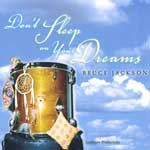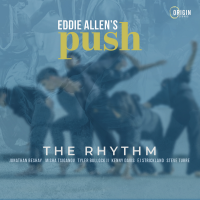Home » Jazz Articles » Interview » Steve Nelson: Vibing
Steve Nelson: Vibing
SN: That might be true. It's a funny thing, after playing that week with Kirk, I'm so much wanting to play with him again because I actually think that there could be more of that. I did more probably, in terms of group interaction and things, than I may have done at one point, but in a weird kind of way Kirk has some of the same energy that Dave has. He gives you a lot of space, too, and he expects you to take it and do something with it. So, I did some of that in terms of interplay with him, because he likes to keep the music going; rather than stop and call tunes, he likes to keep a continuous thing happening, so there's a lot of segues and interludes and things and those are the areas where there's a lot of interplay and I feel like I could have been even more open to that. So, as you say, I probably did more of that than I would have in the Bradley's years, but I could have been even more open and done more.
Which brings me to an important point, which is if you have a band, you can explore more things. That's the great thing about playing with Dave Holland. We have a band, so I can say this to you—that I wish I would have explored more things—and then we'll have another tour, another tour next month and I'll have a chance to do those things. That's the beauty of having a working band.
AAJ: Do you like being a sideman? You don't work as a leader very often. Do you have ideas for leading a group that you want to put into play?
SN: Yeah, I wouldn't mind doing some things as a leader. To be honest with you, a large part of it is probably is just the fact that I have been blessed to get a lot of work as a sideman, so that has kept me busy. Being a bandleader is a serious task and it takes up a huge hunk of time, so you have to really make a conscious decision to make a space for that. Hopefully in the future, none of us are getting any younger, so hopefully I'll be doing more things of my own, to have my own band.
AAJ: You came up learning on the bandstand. These days most jazz musicians learn in the classroom, which you did also. So, you kind of have one foot in each camp. How do you feel about the growing trend of jazz becoming an academic music?
SN: Well ... I don't know. I can honestly say that; in the final analysis, I really don't know. In my case, I was left a lot alone to my own devices for many years before I started school. So I started out learning from the all the cats around town in Pittsburgh in a very, very hands on kind of way, man. I mean the guys would actually take their hands [laughs] and put them on the keys on the piano and say "no, put this finger here and this finger here, for this voicing, etcetera. That's the grounding, that's the roots that I got, so when I came to Rutgers everything was placed on top of that, but I already had the raw materials and the basis because of the background that I got coming up in Pittsburgh and actually that what the cat's saw, I think—what Kenny Barron and all those guys [at Rutgers] saw. They said, "Well he's already got the basic thing going, so he's worth spending the time to mold some more because he's already got a basis going.
The problem comes in, of course, now that there's not such a scene in the cities any more, where guys just don't get that basic training anymore, of coming up and learning from the old cats, cats you never even heard of, you know, the legendary cats in each town. I'm not so sure that there is so much of that anymore, so cats are going directly into the educational system and that's where they're trying to get their base and I think that's part of the problem—they don't have a strong connection to the roots of the music anymore except from an educational institution. But, I mean who's to say? There are fine young players out there, who seem to keep thriving and doing quite well and playing their ass off. So there is something to be said for the fact that...no one is able to say what order you should do things in. Maybe you can go to school and cop that and come out and round yourself off later. It's just not the way that I did it.
AAJ: Is there anything that we haven't talked about that you want to say?
SN: Oh man, Russ, you got so much material here that you could write a book about me.
AAJ: Well that's good because there hasn't been very much written about you up until this point. It's not like I had to spend a lot of time doing research for the interview. There's just not a lot to look up.
SN: I guess you're right about that. You know, there's not that much to say. I'm just basically a guy that grew up in Pittsburgh trying to learn how to play the vibes—learned from my hometown cats in Pittsburgh. I was blessed to grow in Pittsburgh when I did, that's for sure. Since then I've just been trying to play with everybody I can. I've been pretty successful in my career, but I've got a long way to go.
Selected Discography
Steve Nelson, Fuller Nelson (Sunnyside, 2004)
Dave Holland Big Band, Overtime (Dare2/Sunnyside, 2003)
Mulgrew Miller and Wingspan, The Sequel (Max Jazz, 2002)
Steve Nelson, New Beginnings (TCB, 1999)
Bobby Watson, Jewel (Evidence, 1983)
Kenny Barron, Golden Lotus (Muse, 1980)
Photo Credits
Top Photo: Jos L. Knaepen
Center Photo: Alan Nahgian
Bottom Photo: Frans Schellekens
Tags
PREVIOUS / NEXT
Support All About Jazz
 All About Jazz has been a pillar of jazz since 1995, championing it as an art form and, more importantly, supporting the musicians who make it. Our enduring commitment has made "AAJ" one of the most culturally important websites of its kind, read by hundreds of thousands of fans, musicians and industry figures every month.
All About Jazz has been a pillar of jazz since 1995, championing it as an art form and, more importantly, supporting the musicians who make it. Our enduring commitment has made "AAJ" one of the most culturally important websites of its kind, read by hundreds of thousands of fans, musicians and industry figures every month.


























